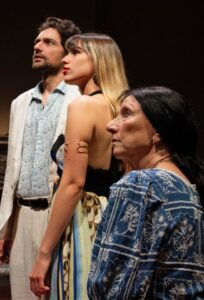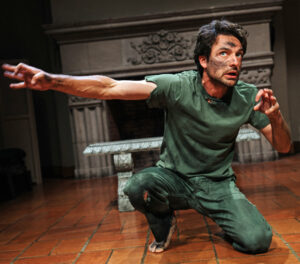The Last Goat
Gary Graves
Central Works

On the small, southernmost Greek island of Kosos in the twelfth century BCE lives a grandmother and her young granddaughter alone amidst groves of fruit trees, lush gardens of vegetables, a surrounding sea of fresh fish, and one lone goat. Any men who once lived there have long been away at a far-off war or have died of the plague. On a morning just like every other one when the chicken coop must be cleaned, beans sowed, and olive trees weeded, a young man in ragged clothes and mud-baked skin arrives half-alive, half-dead and is found collapsed on the floor in their home’s great hall.
And so does playwright and director Gary Graves set the scene for Central Works’ 77th world premiere — 76 of which he has been involved. The Last Goat is a tightly paced, totally captivating eighty minute drama that is a cliff-hanger full of mystery from beginning to end. What is truth and what is false in claims made and stories told? Why does a owl’s haunting hoot lead each of the three to look searchingly out the door and to ask questions like “Is that you?” and “What do you want from us?” How ancient is a Greek tale where its three characters all are dressed in stylish modern and speak not only English, but use modern phrases and slang?

To a young Kori who stands over him holding a threatening Greek sword, the suddenly appearing Nikolas — once he revives from his passed-out state — explains that he washed ashore after being shipwrecked as he was heading back to his home in Mykonos following the end of the many-year war that the Greeks had finally won. Further, he enthusiastically tells the now intrigued girl that his father is rich; Mykonos is in every respect idyllic; and its famous king is both good and a family friend. With no prodding on his part, it soon becomes clear that the young Kori wants more than anything to escape this island of no people other than her demanding, always grouchy grandmother and to find somewhere where she can really live, where having fun is possible — some place exactly like Mykonos.

But when Melina finds Kori talking to this stranger, the grandmother is immediately angry and suspicious of who he is and what he says. After all, the war that took her husband away forty years prior was started by men like this young man and his rich father; and even if the war is finally over and the Greeks actually won, she snarls with bitterness, “What did we win?”
Survival is Melina’s sole, everyday task. She is sure Nikolas has not just by chance come to Kosos, but is here to take over her precious island for his own. And she is not about to let that happen.
An ever-present sword that rarely leaves Melina’s firm grip; the recounting of a sea-monster whose tentacles almost drowned the ship-wrecked Nikolas; a secret potion that sounds like a witch’s brew; and the repeated callings of a far-off bird that cause each of this trio to pause, to look with widened eyes out the open door, and either to praise or to curse its presence — all and more are elements both fantastical and deadly realistic that give Gary Graves’ tale all the more lure.

Each of the three actors in this talented cast of three reveals twists and turns in their character’s development that adds to a sense of our being never quite sure what is the true intent of any of the three nor who will do what to whom, next. Jan Zvaifler is creepily stunning as the grim-faced, sharp-tongued, and totally distrusting Melina who barks commands to her granddaughter and who eyes with clear hate this man who seems to represent all that those of his sex have done to ruin her life. As Kori, Liris Robles is in many ways a typical teen who longs for something, almost anything than the boring life she is currently doomed to live and who is stubbornly determined to make good on her plans to escape — no matter how unrealistic those plans actually are. And the handsome twenty-something man with bright eyes, dimples, a spirit full of optimism, and a repeated promise of his own sincerity and honor is played with contagious intensity and attraction by Andre Amarotico.
But just as the plot presents a route full of twists and turns, so does the development of each of these three and their intentions, all leading to an ending that catches our collective breath and opens the doors of our own imaginations of what happens next.
Projections by Gregory Scharpen help establish the mythological roots of this quite modern tale while his sound designs provide both musical interludes suggestive of Greece as well as the mystical sounds of a bird-like god of goddess. Tammy Berlin’s costumes display a modern elegance of a island resort that is in great contrast to the actual setting of a deserted, ancient isle. Finally, along with his deft direction, Gary Graves’ lighting scheme brings to bear dawn and dusk, noon and midnight.
As its loyal audiences have come to expect, Central Works once again premieres a delightfully alluring new work that deserves nightly packed audiences in the intimate setting of the Berkeley City Club.
Rating: 4.5 E
The Last Goat continues through July 27, 2025, in a eighty-minute (no intermission) world premiere performance at Central Works, at the Berkeley City Club, 2315 Durant, Berkeley, CA. Tickets are available online at https://centralworks.org.
Photo Credits: Robbie Sweeny

Leave a Reply